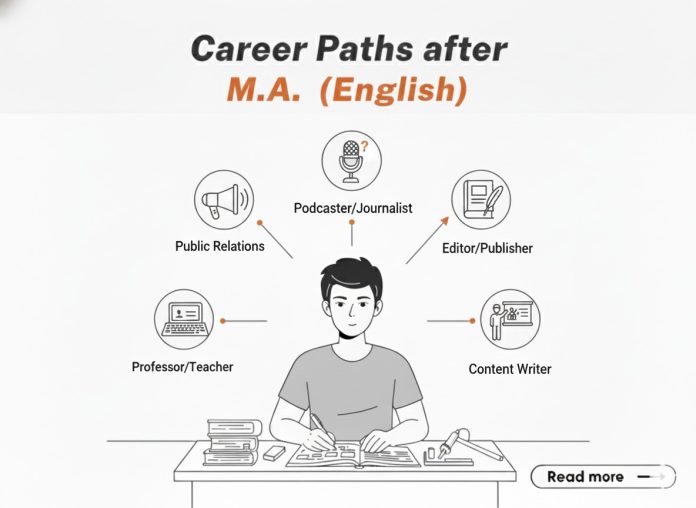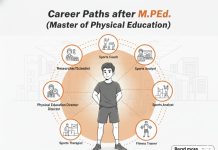- Why Choose M.A. English for Your Career?
- What Is the Scope of M.A. English in Today’s Digital & Creative Industry?
- Why M.A. English Is a Smart Career Choice Today?
- Career Options After M.A. English
- Scope and Salary Trends for M.A. English Graduates
- Top Recruiters & Companies Hiring English Literature Graduates
- What After Graduation? Higher Studies & Professional Certifications in English
- Final Thoughts
- Frequently Asked Questions (FAQs)
Why Choose M.A. English for Your Career?
M.A. English is a two-year postgraduate programme designed for students passionate about literature, language, culture, and communication. It goes far beyond studying classic and modern texts; it equips graduates with critical thinking, writing, research, and analytical skills that are highly valued in today’s professional world.
From teaching and publishing to digital marketing and corporate communications, the career benefits of an M.A. in English extend into diverse industries. Graduates can choose roles in education, media, research, writing, content development, and even global organizations where strong communication and cultural understanding are essential.
In today’s globalized and digital economy, English graduates are in demand not just for their linguistic expertise but also for their ability to analyze, interpret, and create content that resonates across cultures and industries.
At reputed institutions like Lovely Professional University (LPU), the M.A. English programme is designed with both academic depth and industry relevance. Students explore British, American, Indian, and world literature, linguistics, literary criticism, and modern communication while gaining exposure to digital tools, media studies, and creative writing.
What Is the Scope of M.A. English in Today’s Digital & Creative Industry?
The scope of an M.A. in English has expanded significantly in the 21st century. Earlier, English graduates were primarily seen in academia, teaching, or writing careers. Today, the digital revolution and creative industries have opened up dynamic roles that blend language skills with technology, marketing, and media.
Top Industries for English Graduates
- Digital Media & Content Creation – Roles in copywriting, blogging, SEO content, social media strategy, and brand storytelling.
- Publishing & Editing – Working with traditional publishers, online magazines, or self-publishing platforms.
- Creative Industries – Scriptwriting for films, TV, and OTT platforms, advertising, and media communication.
- Corporate Sector – Careers in corporate communications, technical writing, HR, and training.
- EdTech & E-Learning – Content development for digital courses, test-prep platforms, and online education.
English Majors in the Creative Economy
An M.A. English graduate’s ability to analyze narratives and craft compelling communication makes them invaluable in creative industries. From advertising campaigns to web series scripts, their role goes beyond words; they help shape cultural imagination.
Example:
A graduate with strong writing skills can work as a Content Strategist in a digital agency, creating campaigns that engage audiences across platforms like Instagram, YouTube, and LinkedIn.
Why M.A. English Is a Smart Career Choice Today?
Choosing an M.A. in English is not just a passion-driven decision; it is also a strategic career move. Here’s why:
1. High Demand for Communication Experts
In a world dominated by digital communication, clear and impactful content is a powerful tool. English graduates are highly sought after for roles in corporate communication, marketing, and content creation.
2. Diverse Career Opportunities
Unlike technical degrees that may confine graduates to a single industry, M.A. English graduates enjoy career flexibility. They can move into journalism, education, publishing, PR, NGOs, or even international diplomacy.
3. Gateway to Global Careers
English is the lingua franca of business and diplomacy. M.A. English graduates often find opportunities abroad as editors, writers, teachers, and corporate trainers.
4. Evergreen Subject
Literature and communication never lose relevance. While industries evolve, the need for professionals who can analyze society, craft narratives, and bridge cultures remains constant.
5. Future-Proof Skills
Critical thinking, research, cultural analysis, and communication are transferable skills. Whether AI, automation, or globalization shapes the future, English graduates will always be relevant.
Career Options After M.A. English
One of the biggest advantages of pursuing an M.A. in English is the sheer variety of career options it opens up. Graduates are not confined to one industry; instead, they can explore careers in academia, publishing, media, corporate, creative, and even government sectors.
Here are the top career paths after an M.A. in English:
1. Teaching & Academia
- School Teacher (with B.Ed. or equivalent)
- College/University Lecturer (with NET/Ph.D.)
- Online Tutor / E-Learning Faculty
2. Writing & Publishing
- Author / Novelist
- Copywriter / Content Writer
- Editor / Proofreader
- Scriptwriter for films, TV & OTT
3. Media & Journalism
- Journalist (Print/TV/Digital)
- Sub-Editor / Feature Writer
- Media Analyst / Columnist
4. Corporate Careers
- Corporate Communications Specialist
- Technical Writer
- HR & Training Professional
- Public Relations Officer
5. Creative & Cultural Industries
- Screenplay Writer
- Advertising & Branding Specialist
- Theatre / Performing Arts Researcher
6. Government & International Careers
- UPSC, SSC, and State Exams (English helps in essay & comprehension)
- Diplomacy & International Relations (Language expertise is a plus)
| Career Path | Job Role | Average Salary (India) |
| Teaching / Lecturer | English Faculty at School/College | ₹3.5 – ₹7 LPA |
| Content Writing / Editing | Content Writer, Copywriter, Editor | ₹3 – ₹6 LPA |
| Journalism & Media | Reporter, Sub-Editor, Media Analyst | ₹4 – ₹8 LPA |
| Corporate Communication | PR, Corporate Trainer, Communication Lead | ₹5 – ₹10 LPA |
| Publishing & Creative Writing | Author, Scriptwriter, Creative Editor | ₹4 – ₹12 LPA (varies widely) |
- NGO & Social Sector Roles
| Did You Know?
The Indian publishing industry is the sixth-largest in the world, with a market size of over ₹50,000 crore, offering abundant opportunities for English graduates in writing, editing, and publishing. |
Scope & Salary Trends for M.A. English Graduates
The scope of an M.A. in English extends both in India and abroad. With the rise of digital content, corporate communication, and international careers, English graduates are now enjoying better placement opportunities and salary packages than ever before.
Salary Insights (India)
- Freshers: ₹3 – ₹4.5 LPA (content writing, teaching, media)
- Mid-Level Professionals (5–8 years): ₹6 – ₹10 LPA (corporate comms, editing, publishing)
- Senior Roles: ₹12 – ₹20+ LPA (communications head, reputed journalist, successful author)
Salary Insights (Abroad)
- USA / UK: $50,000 – $90,000 per year
- Middle East: ₹15 – ₹25 LPA (teaching, corporate roles)
- Canada / Australia: ₹20 – ₹30 LPA (writing, PR, education)
Key Factors That Influence Salary
- Skillset – Writing, editing, research, communication
- Industry – Publishing, media, academia, corporate
- Location – Metro cities & global hubs offer higher pay
- Experience – Senior writers, editors, and professors command high salaries
Growing Sectors for English Graduates
- Digital Marketing – Content strategists and SEO writers are in high demand.
- EdTech Industry – The rise of platforms like Byju’s, Vedantu, and Coursera has created a need for English content developers.
- Media & Entertainment – OTT platforms like Netflix and Amazon Prime hire English grads for subtitling, scriptwriting, and creative consulting.
- Corporate Training – Soft skills and communication trainers are increasingly valued in MNCs.
| Did You Know?
India is expected to become the world’s largest English-speaking workforce by 2030, further boosting the global employability of M.A. English graduates. |
Higher Studies & Specializations After M.A. English
For students who want to pursue advanced academic or professional growth, an M.A. in English provides a solid foundation for higher studies and specialized fields. Many graduates opt for research, teaching qualifications, or professional certifications that expand their career horizons.
Popular Higher Study Options
- M.Phil./Ph.D. in English Literature
- For those passionate about research, critical analysis, and teaching at the university level.
- Focus on comparative literature, literary criticism, linguistics, or cultural studies.
- B.Ed. or Teaching Certifications
- Essential for those aiming to teach in schools (India or abroad).
- TEFL/TESOL certifications can open opportunities for teaching English internationally.
- Journalism & Mass Communication Courses
- Specialized diplomas in journalism, digital media, or broadcast communication for students targeting media careers.
- Creative Writing & Screenwriting Courses
- Certificate courses in fiction, non-fiction, or screenplay writing for those interested in publishing or the entertainment industries.
- Linguistics & Translation Studies
- Advanced study in linguistics or translation opens jobs in multilingual corporations, publishing houses, and government organizations.
Emerging Specializations
- Digital Humanities – Merging literature with data analysis, AI, and digital tools.
- Postcolonial & Cultural Studies – Exploring identity, diversity, and globalization.
- Gender & Feminist Studies – Research opportunities in academia, NGOs, and policy.
- Technical Communication – A lucrative field for English graduates in the IT and corporate sectors.
| Did You Know?
Many international universities offer funded Ph.D. programmes in English Literature and Cultural Studies, giving students opportunities to work as Teaching Assistants (TAs) while pursuing research. |
Top Recruiters & Alumni Success Stories
An M.A. in English from a reputed institution like Lovely Professional University (LPU) prepares students for careers across industries. The placement opportunities are expanding, with companies from media, publishing, corporate, and education sectors actively hiring English graduates.
Top Recruiters of M.A. English Graduates
- Publishing & Media Houses – The Hindu, Penguin Random House, Times of India, Hindustan Times, HarperCollins.
- Digital & EdTech Companies – Byju’s, Vedantu, Coursera, Unacademy.
- Corporate Sector – TCS, Infosys, Accenture, Wipro, HCL (roles in communication, HR, and training).
- OTT & Entertainment Industry – Netflix, Amazon Prime, Hotstar (for content, subtitling, and scriptwriting).
- International Opportunities – British Council, United Nations, NGOs, and International Schools.
Alumni Success Stories
- Teaching & Academia – Alumni placed as lecturers and professors in reputed colleges across India and abroad.
- Publishing – Graduates working as editors and proofreaders for top publishing houses like Penguin and Oxford University Press.
- Corporate Communication – Alumni placed in MNCs as corporate trainers and communication managers.
- Media & Journalism – English graduates have become columnists, TV anchors, and digital media strategists.
- Creative Writers – Several alumni have published novels, poetry collections, and research papers, gaining recognition nationally and internationally.
Example:
One LPU M.A. English alumnus is now a successful author and communication strategist at a Fortune 500 company, showcasing how versatile the degree can be
| Did You Know?
The Indian media and entertainment industry is projected to grow to ₹3 trillion by 2030, creating demand for writers, editors, and communication experts. |
Student Experience of M.A. English at LPU
At Lovely Professional University (LPU), pursuing an M.A. in English is not just about reading literature; it’s about building a career-ready profile. The programme combines academic depth with practical exposure, preparing students for roles in education, media, publishing, research, and corporate communication.
Highlights of Student Experience
- Diverse Curriculum – Covers British, American, Indian, and world literature, along with linguistics, criticism, and cultural studies.
- Skill Development – Focus on writing, critical analysis, public speaking, and research methodology.
- Workshops & Seminars – Frequent sessions with authors, publishers, journalists, and industry professionals.
- Digital Integration – Training in digital content creation, creative writing, and online publishing.
- Global Exposure – Students interact with peers and faculty from different countries, enhancing cultural perspectives.
- Placements & Internships – LPU provides access to media houses, publishing firms, EdTech companies, and MNCs.
Student Clubs & Activities
- Literary Society – Organizes debates, poetry slams, and literature festivals.
- Drama & Theatre Club – Provides a platform for scriptwriting, stage plays, and performance.
- Creative Writing Hub – Encourages students to publish their work online and in university magazines.
| Did You Know?
LPU hosts one of the largest literary and cultural fests in North India, where students get opportunities to showcase their creative and academic talents. |
Final Words & Conclusion
An M.A. in English is much more than a degree; it is a gateway to a versatile and rewarding career. From classrooms to boardrooms, from publishing houses to international organizations, English graduates find opportunities everywhere.
- For those passionate about teaching and research, academia offers a fulfilling career path.
- For the creatively inclined, writing, media, and publishing are exciting domains.
- For those seeking stability and growth, the corporate communication and EdTech industries provide excellent prospects.
Institutions like Lovely Professional University (LPU) ensure that students not only gain literary knowledge but also acquire 21st-century skills such as digital communication, research, and critical thinking, making them future-ready professionals.
In a world where effective communication is power, an M.A. in English opens doors to global opportunities, lifelong learning, and professional success.
FAQs on Career Paths After M.A. English
Q1. What is the scope of M.A. English in India?
The scope is vast; graduates can work in education, publishing, media, corporate communication, creative industries, and government jobs. With digital industries booming, opportunities in content creation and EdTech are also growing rapidly.
Q2. Can I get a government job after an M.A. in English?
Yes, you can prepare for UPSC, SSC, and State Exams. An English literature background helps in essay writing and comprehension. Additionally, you can apply for teaching jobs in government schools and universities.
Q3. Is M.A. English a good option for teaching abroad?
Absolutely. With certifications like TEFL / TESOL, you can teach English in countries such as Japan, the UAE, China, and European nations.
Q4. What is the average salary after an M.A. in English?
- Freshers: ₹3 – ₹4.5 LPA
- Mid-Level: ₹6 – ₹10 LPA
- Senior Roles: ₹12 – ₹20+ LPA
Abroad, salaries range from ₹20 – ₹60 LPA, depending on the role and location.
Q5. What skills are most important for M.A. English graduates?
Critical thinking, strong communication, writing and editing, cultural analysis, digital literacy, and research skills are key to building a successful career.
Q6. Can I pursue a Ph.D. after an M.A. in English?
Yes, you can pursue an M.Phil. or Ph.D. in English Literature, Linguistics, or Cultural Studies. This opens doors to careers in academia and research globally.




![Is B.Sc. Information Technology [Lateral Entry] the Right Course for You? Is B.Sc. Information Technology [Lateral Entry] the Right Course for You?](https://www.lpu.in/blog/wp-content/uploads/2026/01/Is-B.Sc_.-Information-Technology-Lateral-Entry-the-Right-Course-for-You-218x150.png)









![Is B.Tech. Chemical Engineering [Lateral Entry] the Right Course for You? Is B.Tech. Chemical Engineering [Lateral Entry] the Right Course for You](https://www.lpu.in/blog/wp-content/uploads/2025/11/Is-B.Tech_.-Chemical-Engineering-Lateral-Entry-the-Right-Course-for-You-100x70.png)